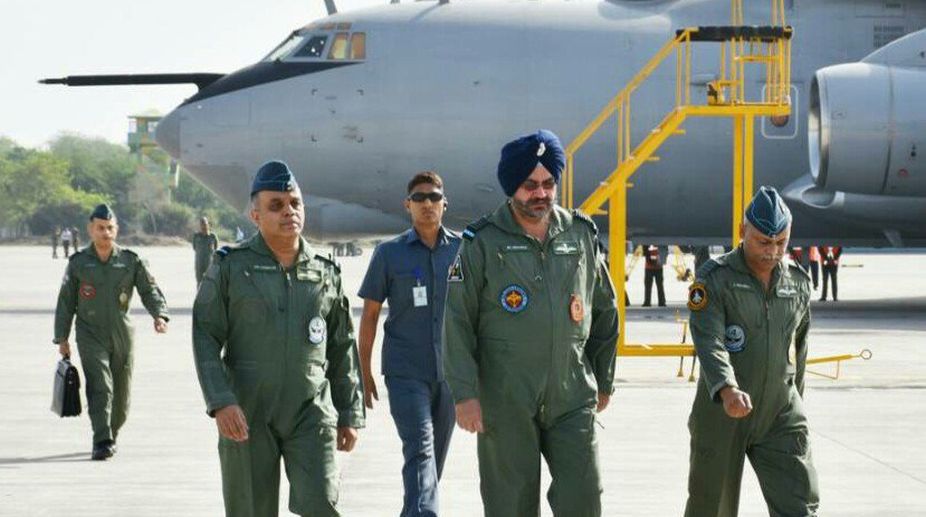IAF organizes IOE25 to promote atmanirbhar defence ecosystem
In a significant push towards enhancing India’s defence capabilities and fostering indigenous innovation, the Indian Air Force (IAF) is set to host the Industry Outreach Event 25 (IOE25).

Air Chief Marshal BS Dhanoa (C) (Photo: Twitter)
Given the prevailing military tensions along the northern frontier, and the recent tendency of jihadi terrorists to launch fidayeen strikes against defence installations, it is not surprising that a communication from the Chief of the Air Staff to all his 12,000-odd officers should be interpreted as the ringing of alarm-bells: some even suggesting that the drums of war were rolling in the distance.
For this was the first time that an Air Chief has sent out a letter of this nature (there are two precedents in the Army), and the tenor does suggest that some three months after assuming the high office Air Chief Marshal BS Dhanoa has deemed it prudent to caution his force against any lowering of the guard.
Advertisement
His missive of 30 March enjoins the officer cadres “to be prepared for operations at very short notice”. And he emphasises that those preparations must be based on “present holdings”, which some deem an oblique reference to the dwindling number of combat squadrons ~ to which no early relief is on the horizon.
Advertisement
Strong sentiments no doubt, but has there been excessive reading between the lines? A perusal of the Air Force Day messages from successive chiefs reveals that the “alert” is not being sounded for the first time, nor is the lament about a depletion of assets particularly “new”, although the situation has not been quite as worrisome as at present.
Hopefully the government will take note of those serious concerns and will expedite acquisition of not just the 36 Rafales on order, but will accelerate the Tejas LCA progamme and push ahead with the overall process to boost air power.
It would, however, be in the best interests of the service to look beyond traditional “laments”, and pay heed to Air Chief Marshal Dhanoa’s exhortation to introspect and address equally debilitating in-house “negatives” in terms of manpower management, postings and promotions etc that are taking their toll.
In an unusually forthright admission the Chief has noted “occasions where lack of professionalism has shown the IAF in poor light.”
He drew attention to “a few instances of favouritism in selection of officers for prime assignments and promotions”; and proceeded to insist on maintaining discipline.
Touching upon another “delicate” issue, the Chief slammed “abusive behavior, resorting to physical intimidation and behaviour amounting to sexual harassment by seniors, which is not acceptable”.
It is seldom, if ever, that a Chief has spoken in such no-nonsense terms, striking at the tendency of the officer cadres to “preserve their own”.
His’ shaking the force out of its comfort zone extended to junking notions of a pecking order among officers’ wives, making it clear that accomplishment will be judged on operational criteria alone. Shabaash Sir, there was urgent need for such straight shooting.
Advertisement